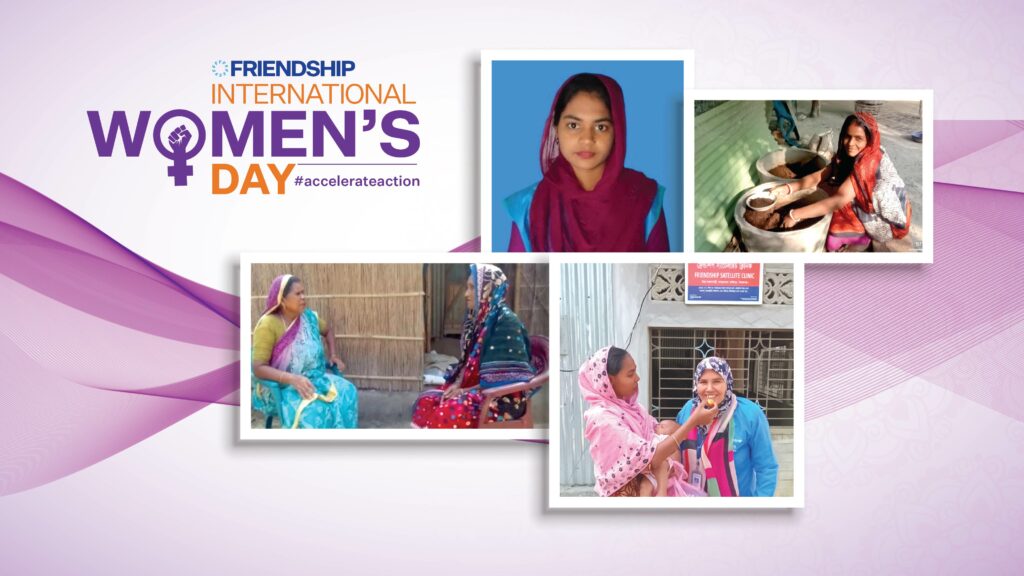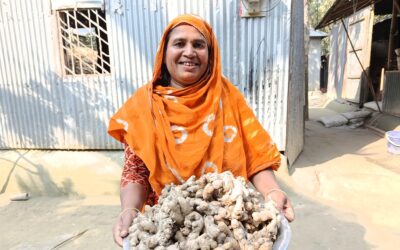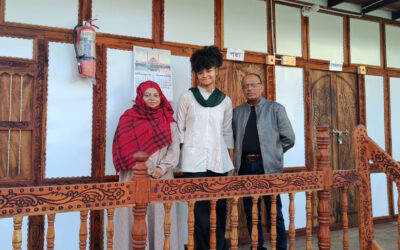
by Friendship News Desk,
March 8, 2025
Every International Women’s Day since 2022, Friendship awards four women, respresenting our four commitments—saving lives, poverty alleviation, climate adaptation and empowerment. Every year, these four recipients of the Women of Valour Award display the kind of determination, resilience, courage, intelligence, hard work, discipline, consistency, grit and leadership that truly leave a substantial impact on their communities, and inspire change in others, especially other women from similar circumstances.
Thus, on international Women’s Day, four women from Friendship shine as beacons accelerating action, empowering change, and upstanding citizenship. They set an example for girls and young women everywhere, that no matter what the circumstances, where there is a will, there is a way.
Healthcare Means Sajeda Apa: The Beacon of Hope for the People of Char
In the remote North Majnabari Char, childbirth was traditionally a home affair, attended by a midwife, steeped in superstition. Safe childbirth, hospitals, and emergency medical care were beyond imagination. But Sajeda Begum changed this reality. Despite being married to a prominent local leader, she dedicated her life to the health and well-being of her community.
In 2015, when Friendship launched health services in the area, Sajeda expressed her desire to become a health worker (FCM). Through rigorous exams and training, she gradually gained the trust of her community. Initially overlooked, her determination and sincerity made her a symbol of trust and empowerment.
Sajeda traveled door to door, offering health advice, encouraging safe childbirth, and raising awareness about issues like child marriage, sanitation, and nutrition. However, her toughest challenge was convincing people to opt for institutional deliveries. Superstitions kept many families from seeking hospital care, believing home births were safer.
In October 2024, during a Friendship meeting, Sajeda vowed that no more home deliveries would take place in her char. Over time, her efforts paid off, with 7 out of 8 deliveries successfully taking place in hospitals.
One of her most significant achievements came when she saved a high-risk pregnant woman, Jesmin, whose family initially refused hospital care. Thanks to Sajeda’s intervention, Jesmin gave birth to a healthy son. Today, Sajeda is not just a health worker, but a symbol of hope, trust, and change for the people of her char.
From Struggles to Success: Purnima Rani’s Story
Purnima Rani, wife of Romen Biswas, hails from Sonamugari village in Shyamnagar Upazila, Satkhira district. Born into a poor farming family, her life was full of hardships. At just 14, her education was cut short when her father arranged her marriage to Romen, a day laborer. Struggling with poverty, the couple worked on others’ lands to sustain their family.
Despite these challenges, Purnima refused to give up. A turning point came when she joined Friendship’s SED Sector, becoming a member of the Farmers’ Club. She attended regular training sessions and learned vegetable cultivation, poultry farming, and organic compost production. With support from Friendship, she received earthworms, organic compost materials, and resources to start her own business.
Today, Purnima is a successful entrepreneur. She sells 4-5 kg of earthworms and 40-80 kg of organic compost per month. She uses the compost for her vegetable farming and sells the surplus in the local market. With Friendship’s marketing support, her monthly earnings now range between BDT 10,000-12,000. Her family no longer struggles with poverty, and they can afford their children’s education.
Purnima’s story is not just about struggle—it’s a tale of determination and success. Once a day laborer, she is now self-reliant and an inspiration to other women striving for a better future.
Rozina Akter: From Volunteer to Climate Resilience Leader
Rozina Akter, a 20-year-old flood volunteer from Sapla Bazar, has been a pillar of support for her community. Growing up in the flood-prone char region of Fulchari, Gaibandha, she witnessed the devastation firsthand, inspiring her to take action.
During last year’s catastrophic floods, Rozina played a key role in disaster response under the Contingency Action Plan (CAP). She and her team prevented the collapse of a crucial road, ensuring the safe evacuation of 350 families. She also helped disseminate early warnings, allowing residents to prepare and evacuate in time.
As a female volunteer in a conservative community, Rozina initially faced skepticism. Many disapproved of her working alongside male volunteers, and limited resources made her job even harder. Yet, her determination and the visible impact of her efforts gradually earned her trust and respect.
Recognizing her dedication, Friendship offered her a formal role as an FCGA under the ASD Project, enabling her to expand her disaster risk reduction efforts. She now trains others and advocates for more women in leadership roles. With enhanced skills and ongoing training, she envisions a future where young people, especially women, take an active role in disaster preparedness.
Rozina’s journey highlights the power of grassroots leadership in building climate resilience. Her unwavering commitment proves that investing in local leaders can help communities better withstand climate disasters, ultimately saving lives and securing livelihoods.
Champion of Change: Manowara’s Impact on Community Rights
Mosammat Manowara, president of Meghna Dal in Baish Para Char, has become a driving force for change in her community. Through the Friendship Civil Society Group (FCSG), she has tackled child marriage, poverty, and climate challenges while empowering marginalized groups.
Manowara actively prevents child marriages, ensuring children’s rights to education and safety. Her efforts have not only rescued young girls but have also shifted community attitudes toward gender equality.
In the fight against poverty, she helps secure social security resources for her village. She facilitated rice seed distribution for 10 farmers, collaborated with the Upazila Livestock Office to train 40 women in income-generating skills, and partnered with NGOs to build cattle sheds and homes. To combat climate challenges, she promotes sustainable farming, provides farmers with drought-resistant seeds, and leads emergency response efforts during floods and river erosion. Her work safeguards livelihoods and fosters environmental awareness.
Manowara is also a trusted mediator, resolving disputes and advocating for women’s rights. Her leadership has inspired women to take active roles in decision-making, promoting a more inclusive society.
She credits Friendship for equipping her with the skills to uplift vulnerable groups. Through her dedication, Manowara has transformed lives, earning respect as a leader who drives sustainable change in her community.



